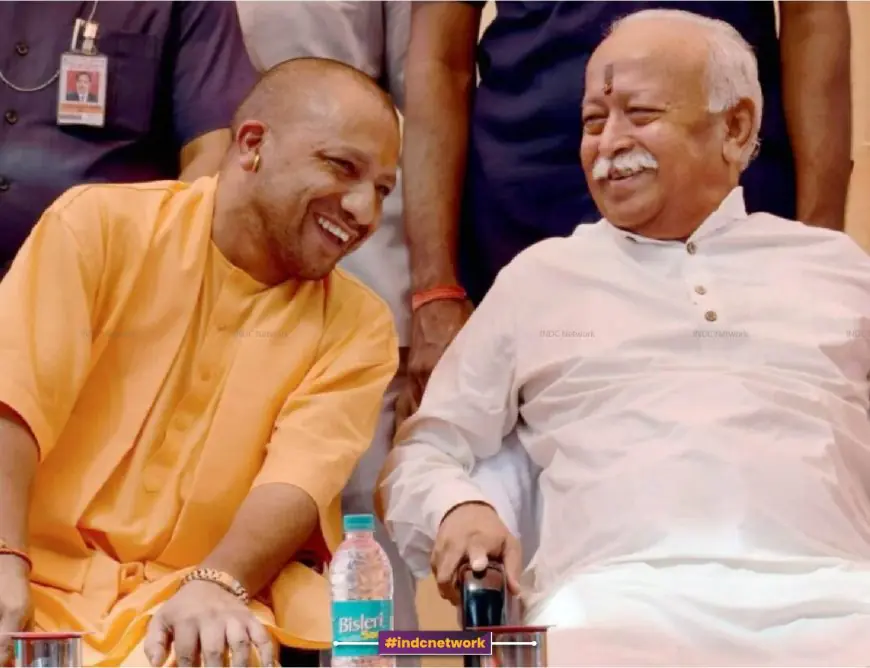Unity or Division? Inside the RSS and CM Yogi’s Call to Protect Hindu Welfare and Nation
Rashtriya Swayamsevak Sangh (RSS) General Secretary Dattatreya Hosabale echoed Uttar Pradesh Chief Minister Yogi Adityanath's assertion on the importance of Hindu unity, warning against division along religious, caste, and ideological lines. In a meeting, Hosabale urged unity to safeguard social welfare and security, aligning with CM Yogi’s statement that "if we divide, we will be cut." Their words underscore a vision for Hindu solidarity as a foundation for India's harmony, addressing topics like the Mathura temple dispute, Waqf Amendment Bill, social media content regulation, and RSS's expansion plans.

INDC Network : Uttar Pradesh : In a recent assembly at Deendayal Upadhyay Gau Vigyan Anusandhan Evam Prashikshan Kendra, Rashtriya Swayamsevak Sangh (RSS) General Secretary Dattatreya Hosabale addressed pressing societal concerns that spanned beyond the state of Uttar Pradesh, emphasizing the significance of unity within Hindu society. Hosabale’s address came during the two-day All India Executive Board meeting of the RSS, where he underscored Chief Minister Yogi Adityanath's sentiments on the vulnerability that comes with division, “If we divide, we will be cut.” This assertion reverberated throughout the assembly, where unity was painted not only as a strategy for self-preservation but as a foundation for public welfare and social stability. Hosabale contended that Hindu society's unity was necessary to protect the broader welfare and security of the nation.
The gathering sparked renewed attention towards the goals of the RSS, as it prepares to celebrate its centenary next year. However, this appeal for unity is not without contention, especially as RSS’s stance on Hindu consolidation has faced varying responses from across the political and social spectrum.
Echoing CM Yogi’s Call for Unity in a Time of Division
Uttar Pradesh Chief Minister Yogi Adityanath’s statement, "If we divide, we will be cut," was highlighted by Hosabale, who viewed it as a reminder of the detrimental consequences of division by caste, religion, or regional ideology. Hosabale’s speech underscored a historical perspective, where he noted that Hindu society’s past fractures have often invited disaster. He pointed to moments in Indian history when divisions in Hindu society, due to caste or ideology, had brought vulnerability and upheaval. "When Hindu sentiments are forgotten," he remarked, "disasters come, families are torn apart, land is lost, and places of worship are destroyed."
Hosabale's address linked Hindu unity to public welfare, stating that, “It will require consistent effort, not mere lip service.” He acknowledged that reinforcing unity in Hindu society was a practical necessity to achieve lasting peace and security. His call to action came with a clear instruction for those attending the meeting: make Hindu unity a proactive and practiced part of daily life.
The Sangh’s Take on Mathura and the Waqf Amendment Bill
Touching on the ongoing issue surrounding the Shri Krishna Janmabhoomi-Shahi Idgah dispute in Mathura, Hosabale shared that the matter was currently awaiting judicial resolution. He stated, “There is no need to emulate the Ayodhya model for Mathura,” indicating that the RSS supports a judicial, rather than confrontational, resolution. This approach appeared aimed at fostering patience among Hindus who view Mathura with the same reverence as Ayodhya, advocating for faith in the judicial process over civil agitation.
In response to questions about the Waqf Amendment Bill, Hosabale spoke on behalf of the RSS, expressing apprehension over certain provisions that, he argued, have created complications for Hindu and Muslim communities alike. He noted that the previous Waqf Act amendments gave Waqf boards authority to claim land, often without local administrative oversight, a move which he suggested was part of a broader “conspiracy.” These comments align with the RSS’s calls for a more balanced Waqf amendment that would ensure transparency and equal oversight.
Hosabale also mentioned that concerns with the Waqf Amendment Bill have come from both Hindu and Muslim communities. While the legislation has been championed as an attempt to preserve Waqf properties, some groups have argued that these laws create imbalances by granting Waqf boards significant autonomy. "Many Muslims have voiced their issues, especially regarding unchecked autonomy," he added, underscoring that the need for fairness transcends individual religious groups.
RSS’s Focus on Social Media and Content Regulation
The increasing influence of social media and independent digital content was another point of discussion. Hosabale observed that the widespread, unregulated nature of digital content platforms poses a potential risk to youth, especially through exposure to material that may harm societal values or personal development. He expressed that, while freedom of expression remains paramount, there is a need for digital content regulation. “In classrooms and bedrooms alike, these platforms are accessible without oversight,” he noted, proposing that government regulations be implemented after consultations with society to strike a balance between freedom and responsibility.
Addressing concerns on "Love Jihad" and religious conversions, Hosabale clarified that RSS does not directly involve itself in specific incidents, rather works through affiliates like the Hindu Jagran Manch and Bajrang Dal. These organizations, he explained, investigate cases where women might be exploited due to socio-economic vulnerability. He recounted an incident in Kerala, where 200 women, initially victims of such circumstances, were assisted by RSS-aligned organizations to reintegrate into society. The Sangh's role, he asserted, is in supporting these women’s rehabilitation, sometimes training and educating them to prevent further incidents.
Expansion and Future Plans of the RSS
In a clear signal of the organization’s intent to maintain its influence in Indian society, Hosabale revealed that the RSS has grown by adding over 3,600 new branches in the past year, now functioning at 72,354 branches in 45,411 locations across India. The organization’s growth indicates a demand among sections of society for the Sangh’s vision and outreach.
Entering its centenary, the RSS has set its sights on a variety of social initiatives, which Hosabale referred to as the “Panch Parivartan” topics: self-based lifestyle, social harmony, family enlightenment, environmental responsibility, and civic duty. These themes, he explained, would be used to foster engagement and unity across society, encouraging an awareness of civic responsibility among Hindu communities.
CM Yogi and RSS: No Tensions, Only Partnership
Recent speculation had suggested potential discord between the RSS and the BJP, but Hosabale was quick to dispel this. He clarified that RSS is a public organization that engages with various parties and holds no favoritism, remarking that “there is no quarrel with the BJP.” While the RSS's agenda aligns with certain political objectives, Hosabale emphasized the organization’s independence and commitment to broader societal welfare, indicating a cooperative relationship between the RSS and the BJP rather than a competitive one.
CM Yogi’s meeting with RSS Chief Mohan Bhagwat had reportedly been scheduled to discuss preparations for the Kumbh Mela in Prayagraj. Yogi Adityanath requested support in increasing participation from the tribal communities for the religious event, an appeal which Bhagwat agreed to encourage within the RSS ranks. This gesture of cooperation further highlights the intertwined efforts of RSS and state officials toward fostering a unified and inclusive Hindu society.
Conclusion: Unifying Hindu Society to Protect India’s Future
With a tone of cautious optimism, Hosabale’s address served as a rallying call, urging unity within Hindu society as essential not only for self-preservation but for India’s social stability and peace. As the RSS advances into its centenary, the organization’s focus on societal harmony and national unity marks a significant phase in its journey. The message was clear: in an increasingly polarized world, a unified Hindu society would serve as a bulwark for public welfare, social harmony, and national security.
What's Your Reaction?













































































































































































